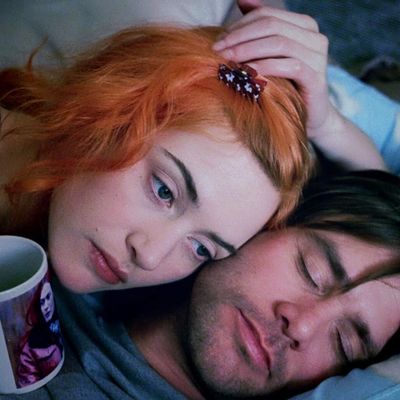
Every week for the foreseeable future, Vulture will be selecting one film to watch as part of our Friday Night Movie Club. This week’s selection comes from senior writer Nate Jones, who will begin his screening of Eternal Sunshine of the Spotless Mind on August 21 at 7 p.m. ET. Head to Vulture’s Twitter to catch his live commentary, and look ahead at next week’s movie here.
The present sucks. The future feels unfathomable. Why not escape into the past?
Because there’s not much else to do these days besides brood, I’ve been thinking a lot recently about the films I loved in high school. These were the early Bush years, where the dominant aesthetic was shiny, spiky, and a little rank. (Think Paris Hilton, or Girls Gone Wild.) But it was also the time of what was called “the New Sincerity,” a strain of culture that, as one manifesto explained, was a strange amalgam of artifice and innocence. Amid the trauma and violence of the age, my favorite artists cosseted themselves in fantasy worlds filled with pure, childlike emotion: a heart on the sleeve of a thrift-store sweater. You heard it from bands like the Postal Service, Bright Eyes, and the Polyphonic Spree, and all over the subgenre Matthew Perpetua dubbed “modular pop.” And you especially saw it at the movies, in a selection of gems that make up a key part of the Millennial Canon — The Royal Tenenbaums, Amélie, Garden State, and more. They could be precious and over-aestheticized, but there was also something shaggy and handmade about them. For a pretentious nerd, it was catnip.
The early ’00s were a golden age for indie cinema, even if the term “indie” was by then a bit of a misnomer, as most of the genre’s hallmarks were released by wholly owned subsidiaries of major corporations. (Searchlight was owned by Fox, of course, while Focus Features was part of Universal.) A few got wide releases, but others were just slightly inaccessible, in a way that feels foreign in the streaming era. Before we could drive, if my friends and I wanted to see a movie with subtitles, we had to literally travel by train, taking the lumbering SEPTA R5 to an arthouse theater a few towns away. If you missed it, the next one didn’t come for another hour. And we usually missed it, so these outings quickly became all-day affairs; the effort involved was part of the point. These Searchlight and Focus movies weren’t exactly small or obscure, but I think of them now as baby steps for budding cinephiles. It’s a little sad that the most lasting specimen of this subculture turned out to be Seth Cohen from The O.C., but few of us get to choose our monuments.
When these movies are discussed now, it’s often with a slight cringe. Values have shifted; hyperarticulate sensitivity has given way to moral forthrightness. (For more, read this essay on Garden State by my colleague Jesse David Fox.) It’s possible that much of this is Old Millennials being too harsh to our younger selves, but all the same, I’ve been refraining from revisiting most of my high-school favorites. Not because I’m worried about what my love for them says about me, but because I want to keep my feelings about them big, bright, and overwhelming, in the way of all teenage emotion. Why make it more complicated?
Which brings me to my favorite “New Sincerity” movie of them all, the one that’s inextricably linked to my own impressions of the early aughts. Michel Gondry’s Eternal Sunshine of the Spotless Mind is a film about looking back on your past, trying to figure out whether it’s worth it to keep mining your memories for meaning, or whether we’d be better off letting go of them entirely. For me, this was the peak. Eternal Sunshine was everything I wanted in a movie when I was 17: a whimsical visual imagination, courtesy of Gondry’s magnificent in-camera effects; a characteristically mind-bending script from Charlie Kaufman; a female love interest who simultaneously embodies and subverts the Manic Pixie Dream Girl archetype; and in Jim Carrey’s lead, the perfect avatar for a teenage boy who had never been in love, but had plenty of experience mentally replaying every quasi-romantic interaction over and over again, which according to these movies was basically the same thing. (In a slightly embarrassing meta twist, Jon Brion’s soundtrack is tied up in memories of a senior-year crush who burned me the CD in October 2004.)
I was so obsessed with Eternal Sunshine in high school that, since I went to college, I have been too scared to ever rewatch it. This movie was simply too integral a part of my identity to risk its memory being tarnished. I was not alone: In film school, my middle-aged Hungarian professor erupted at the mere mention of it. Bourgeois suburban students, watch another movie!
But as a man once said: Everybody’s gotta learn sometimes. And so, as we prepare to enter a fall that itself seems haunted by the specter of 2004, it’s time to bite the bullet, and see if the real thing is really as great as my memories of it, or if I was idealizing it all out of proportion. Let’s take the train out to Montauk, and see what we find.
Eternal Sunshine of the Spotless Mind is available to stream with a Netflix subscription, and is available to rent on YouTube, Google Play, Vudu, Prime Video, and iTunes.
More From This Series
- Helen Hunt Answers Every Question We Have About Twister
- Mr. and Mrs. Smith Is a Straight Shot of Movie Star Charisma
- The Timeless Honesty of Wild Style, the First Hip-Hop Movie


